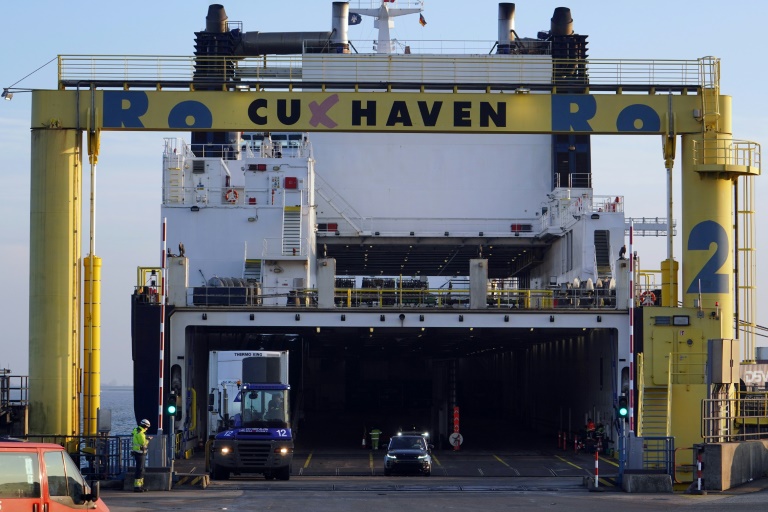How Germany’s Cuxhaven port is navigating Brexit
Cuxhaven (Germany) (AFP) – The German port of Cuxhaven has felt every twist and turn of the Brexit saga, from the shock of the referendum result to the interminable negotiations.
Now, with the end of the transition period that has effectively kept Britain in the EU fast approaching, port manager Hans-Peter Zint has only one wish: “It has to finally happen.”
But Brexit will remain an unprecedented challenge for the North Sea port long after Britain’s newly agreed deal with the EU kicks in on January 1.
Around 85 percent of maritime freight to and from Cuxhaven involves the UK, making it one of the harbours worst affected by Brexit.
The scale of the task can be seen from Zint’s office. Hundreds of Mercedes and BMW cars from German factories are waiting to be loaded onto a ship that has just arrived from the port of Immingham, on the east coast of England.
As it docks, the ship opens its hatches and unloads Land Rovers, made in Britain, destined for the continental market, as well as metal parts for the construction industry.
The operation will take a few hours before the ship returns to Immingham, some 20 hours away.
“Today we have no customs formalities to carry out, but in the future they will apply to 85 percent of our goods. It’s uncharted territory for Cuxhaven,” Zint told AFP.
This is not the case for other large ports nearby, such as the mighty Hamburg, which are less dependent on British clients and more accustomed to trading outside the EU.
– Climate of uncertainty –
“It’s been a lot of preparation over the last three years,” Zint said, exhausted by the climate of uncertainty that has prevailed since 2016.
“There comes a time when you say to yourself, ‘It has to finally happen.'”
The German car industry will be one of the first to feel the consequences of Brexit.
The UK was the largest export market for German car manufacturers in 2019, with nearly 600,000 vehicles, or around 17 percent of automotive exports, according to car industry association VDA.
Cuxhaven’s preparations have focused on three main strands: training for staff in new customs procedures; a new IT system to facilitate the transmission of customs documents; and the expansion of the terminal and storage areas.
A lot is at stake: Britain was Germany’s seventh largest trading partner in 2019, albeit two places lower than before the referendum.
“According to our simulations, if every link in the chain does its job well, from seller to customer, the transport times shouldn’t get any longer,” the manager said.
“But these are still only tests, and now we must see if everything works in reality,” he admits.
– ‘A strange year’ –
Heavy goods vehicles are constantly flowing in and out of the port at the mouth of the Elbe River.
After a fall in activity in spring due to the pandemic, Germany and Britain worked hard to get as much freight through as possible before the end of the transition period.
“It’s been a strange year,” sighs Marcus Braue, local manager for Danish maritime company DFDS, which operates two daily routes between Cuxhaven and Immingham.
“Most companies are well prepared, but some –- for whom the British market is not central –- are just beginning to worry about future formalities,” he said.
The trade deal agreed on December 24 has finally put to bed the worst-case scenario of a no-deal Brexit, which could have dramatically raised the price of goods transported via Cuxhaven and put a stranglehold on commercial activity.
But the threat of administrative chaos and traffic jams remains.
However, Cuxhaven believes it has an advantage over maritime giants such as Hamburg, Calais or Rotterdam.
“Here, only the trailers are shipped — the drivers don’t accompany their goods,” Zint said.
“If in the future we’re faced with incorrect or missing documents, the trailers can be put on hold without blocking the drivers.”
The German port therefore hopes to win new customers looking for less congested routes.
Zint is even willing to bet that, “In three or five years, Brexit will have blown over. It will be ancient history.”
Disclaimer: Validity of the above story is for 7 Days from original date of publishing. Source: AFP.


